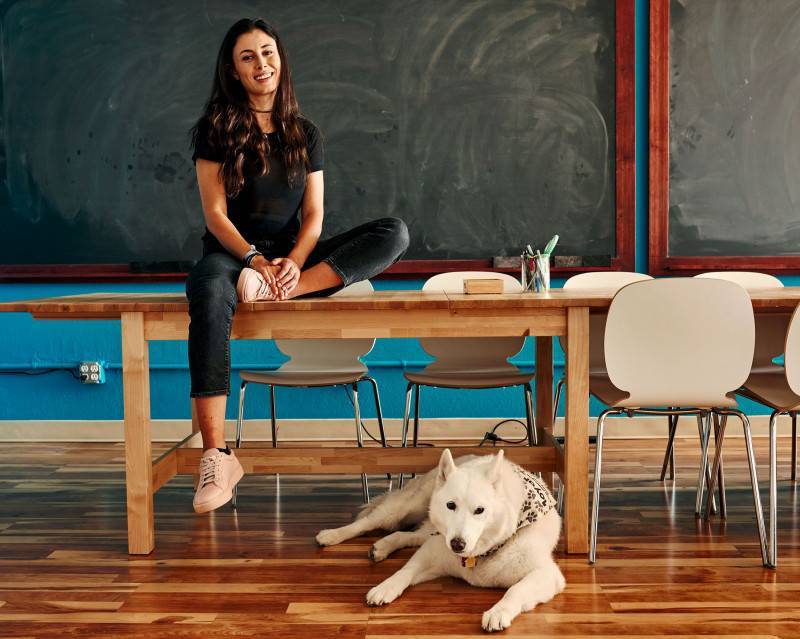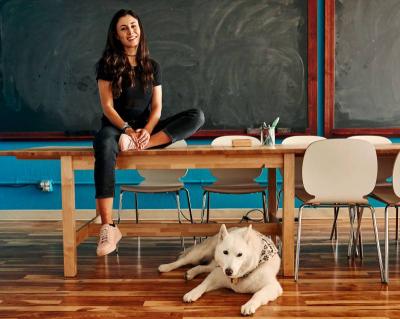As the tech sector matures, people in Silicon Valley have become obsessed with developing ways to halt the natural progression of aging in humans. Initially, maintaining youth required activities such as long-distance cycling or following intermittent fasting diets. However, some investors and employees from startups have progressed to more advanced methods, including taking dozens of anti-aging pills each morning, injecting stem cells into their brains, or pumping young and vital blood into their bodies.
**Limited Experiments**
Experiments aimed at extending human life are still conducted on a limited scale, likely due to their unusual nature and the lack of substantial evidence supporting their success. However, Celine Halioua, the founder of the startup Cellular Longevity, has a plan to popularize this field by using dogs.
Halioua's company focuses on developing treatments to extend the lifespan of dogs and make them more active as they age. If such treatments prove successful in dogs, the 26-year-old Halioua expects that consumers and regulators will be more inclined to apply similar techniques to humans. She explains, "Dogs are undoubtedly the best model to observe the stages of human aging. We've evolved with them, they share our environment, and they also suffer from age-related diseases over time. Therefore, if we can extend dogs' lives, people will want to apply that to themselves too."
**Funding of $11 Million**
Halioua's company, which markets its products under the brand name Loyal, has raised about $11 million in funding and plans to start preliminary trials in early 2022 using two chemical compounds she declined to name but confirmed have potential anti-aging properties.
The primary obstacle to developing anti-aging drugs and treatments for humans is that people already live long lives. Pharmaceutical companies are hesitant to invest in clinical trials that span decades to develop such drugs. The FDA is more comfortable approving drugs that address specific diseases or conditions rather than producing a medication for something broad and undefined like aging. As a result, a number of promising anti-aging compounds have yet to be significantly tested on people in clinical trials.
The idea of conducting such experiments on dogs isn't entirely new. For several years, around 30,000 dog owners have enrolled their pets in the Dog Aging Project, an academic research study supported by $25 million from the National Institutes of Health in the United States.
**Environmental and Genetic Factors**
The project is studying how genetic and environmental factors impact the aging processes in dogs, and it is also conducting another experiment where around 200 middle-aged dogs are receiving the compound rapamycin, typically used in humans to prevent organ rejection post-transplant and in some cancer patients. Matt Kaeberlein, a pathology professor at the University of Washington and a co-director of the project, states, "Rapamycin has shown to delay or reverse aging markers in all examined tissues to a significant extent."
However, despite rapamycin's great potential, it has gained a poor reputation among doctors due to numerous side effects seen in organ transplant patients, who experienced issues ranging from mouth ulcers to cases of diabetes. Kaeberlein, who also advises Cellular Longevity, suggests that these side effects occur due to the high dosages given to transplant patients. He anticipates fewer issues with the lower doses offered in the pills his team secretly mixes into peanut butter for the dogs. Kaeberlein has used rapamycin himself to reduce inflammation and pain in his shoulder, stating, “I believe in this compound’s abilities,” although he emphasizes that his experience should not be taken as a recommendation for others to conduct similar trials.
**Encouraging Studies**
Studies conducted on dogs that imposed calorie restrictions showed that a dog's lifespan could increase by approximately two years, while also delaying the onset of cancer and other chronic bone diseases. Scientists expect that combining different treatments could yield more effective outcomes. Kaeberlein notes, "We might be talking about an effect of 50%, 60%, or 70% on lifespan," adding that it is very difficult to predict the exact efficacy of this drug without conducting trials.
Halioua, who was working toward a Ph.D. at the University of Oxford studying the economics of gene therapies, left her studies in 2019 to work at the Longevity VC fund, a venture capital firm based in San Francisco. Halioua assisted in research and investment for over 20 aging companies for the fund before pitching her idea for her startup to Laura Deming, a managing partner at the firm.
Initially, Deming was skeptical about the project’s success. She didn’t have pets and struggled to grasp the idea that pet owners would spend significant amounts of money to extend their dogs' lives. She said, "I didn’t understand the idea of the project."
**Involvement of Pet Owners**
Ultimately, Halioua convinced Deming to invest, and she left the fund to start Cellular Longevity in 2020. The company aims to recruit hundreds of pet owners to participate in studies with the goal of obtaining a licensed treatment for dogs by 2024. The first trial will target larger breeds, which tend to have shorter lifespans, while the second trial will involve all breeds. The aim is for pet owners to expect their pets to live longer—by six months to three years—with better and more active lives as well.
Halioua avoids specifying her exact expectations regarding the potential duration by which a dog's life can ultimately be increased, while also downplaying any exaggerated expectations that might border on science fiction. She states, "We won’t be giving dogs lifespans of 80 years."
Halioua has not disclosed much information about pricing, only indicating that Loyal products will be "affordable but not overly cheap," with prices expected to drop over time.
**Anti-Aging Medications**
One of the main strengths of using dogs in experiments is that clinical studies can be conducted within three to five years, while dogs live in their homes under natural conditions. This represents a significant step forward compared to laboratory rats, which are often used in these types of experiments, are small, and must be bred from birth or replaced to study age-related diseases.
Deming believes that the approach of “testing on dogs first” could be key to helping people prepare for anti-aging technologies. She adds, “If the trials succeed in dogs, the prevalent psychology regarding aging drugs could change significantly. This could be the turning point where these medications become more mainstream.”
Loyal does not rule out the possibility of eventually expanding its operations to include humans. However, in the meantime, Halioua is pleased not to have to conduct trials solely on rats. She states, “We have extended rats' lifespans hundreds of times, and no one outside the field cared because it’s just a rat. But doing those experiments on a living being that people care about can change a lot in the field of aging research, and I am working to prove my point.”




